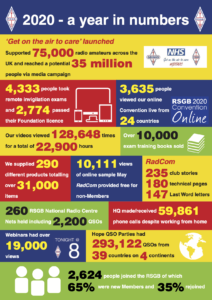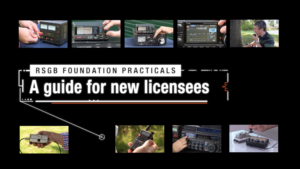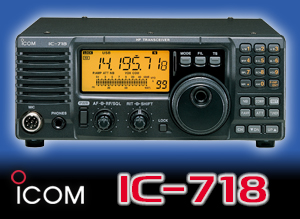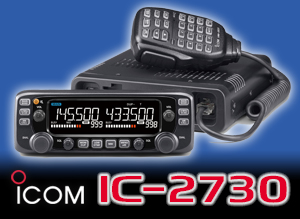2020 – a year in numbers
2020 brought devastation across the world as we all faced the effects of the pandemic. The RSGB rose to the challenge of supporting radio amateurs in the UK and providing new ways for people to get started in, or come back to, amateur radio.
The April 2021 RadCom will show in detail the work of the committees and other specialist volunteers, but here we bring you an overview of the great amateur radio success story we have seen over the last year, in which RSGB HQ staff have often led the way. The infographic shows the highlights whilst the fuller story and numbers are shared below.
Get on the air to care
In April 2020, the RSGB launched an unprecedented campaign with the NHS called Get on the air to care (GOTA2C). Its aim was to support radio amateurs, counter social isolation and raise the profile of amateur radio amongst people looking for something to do during lockdown.
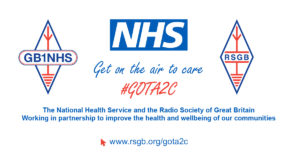 We ran a media campaign that gained widespread coverage across TV, BBC News online and BBC local radio stations, national newspapers as well as local news outlets, NHS videos and social media. It was also supported by amateur radio media and societies across the world. A media monitoring company has tracked our coverage and the numbers show our potential reach in 2020 was over 35 million people, most of whom were hearing about amateur radio for the first time. If you type GOTA2C into an online search engine, it brings up nearly 7,000 results.
We ran a media campaign that gained widespread coverage across TV, BBC News online and BBC local radio stations, national newspapers as well as local news outlets, NHS videos and social media. It was also supported by amateur radio media and societies across the world. A media monitoring company has tracked our coverage and the numbers show our potential reach in 2020 was over 35 million people, most of whom were hearing about amateur radio for the first time. If you type GOTA2C into an online search engine, it brings up nearly 7,000 results.
The campaign received the Amateur Radio Newsline’s ‘International Newsmaker of the Year’ award, with this citation: “As well as enabling people to get involved in amateur radio for the first time and encouraging inactive hams to return, the campaign has accomplished something amateurs work so hard to achieve: placing amateur radio front and centre in mainstream media channels such as the BBC, ITV Wales and major newspapers. It has raised amateur radio’s profile and attracted new licence-holders”.
We are incredibly proud to have brought amateur radio to the attention of so many people and are delighted that this media coverage has been cited as the reason many people have returned to being active radio amateurs.
GOTA2C was also the framework for a range of fresh activities that enabled new and existing radio amateurs to access and enjoy amateur radio during these difficult times.
Remote invigilation exams
The introduction of remote invigilation exams, initially just for the Foundation licence, opened the floodgates for people wanting to enjoy amateur radio during the restrictions. Thirty-five remote invigilators oversaw 2,774 people pass their Foundation licence. The youngest new licensee was just nine whilst the oldest was 87 – showing that amateur radio has something for everyone.
We extended remote invigilation to the Intermediate exam in July and then to the Full licence exam in September. This not only provided a route to do the exam for those who had booked at an exam centre before the lockdown, but also enabled many of the new licensees to progress and enjoy wider access to amateur radio. By the end of the year, 868 people had taken the Intermediate and 378 had sat the Full.
Tonight @ 8
We introduced a free monthly live webinar series to provide information and a focus for radio amateurs while they were spending more time at home. Facilitated technically by David, G7URP and Tammy, M0TC and organised by a small team of HQ staff and volunteers, the eight webinars covered a range of subjects including the Raspberry Pi, antennas for small gardens, and introductions to both SOTA and GNU Radio. Some of the topics were chosen specially to inform and encourage the thousands of new and returning licensees who got involved in amateur radio during the challenges of 2020.
We were joined by hundreds of radio amateurs from across the world who watched the webinars live on our YouTube or BATC channels. Thousands also caught up with the presentations afterwards on YouTube – in fact, the presentations had over 19,000 views last year and the feedback has been overwhelmingly positive.
Hope QSO Parties
Two series of daytime Hope QSO Parties in the spring drew together radio amateurs from across the world. They offered four modes – SSB, CW, FT4 and RTTY – to allow people to take part in different ways. A total of 293,122 QSOs were made from 39 countries and the organisers received 6,594 logs from stations in the continents of Europe, North America, Africa and Asia.
This activity was given the special Award of Merit by CDXC – The UK DX Foundation, with the following citation: “This well-planned and well-executed initiative from the HF contest committee led by Nick, G4FAL and very efficiently implemented by the RSGB Contest Support Committee created daily on-air activity during a difficult time and encouraged regular involvement in HF contesting by many UK and overseas amateurs. The CDXC committee felt that this deserved special recognition and we are delighted to issue this award”.
Construction competitions
With time on their hands, radio amateurs entered a range of projects into our Annual Construction Competition. Both new and seasoned licensees showcased their skills in software, hardware and kit-building and encouraged others to try their hand at creating something.
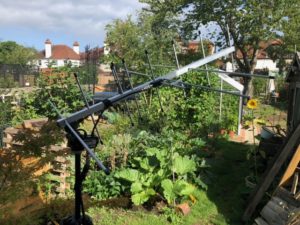
Eric Stammers, M7EJS Construction Competition Beginners category winner
Entries ranged from a set of satellite antennas created by Eric Stammers, M7EJS who had only gained his Foundation licence in June 2020, to a mapping system designed by experienced radio amateur Heather Lomond, M0HMO. The ‘Lockdown’ category winner Roy Bailey, G0VFS donated his winning entry for our ‘Get on the air for Christmas’ auction which raised £1,025.99 for NHS Charities Together – a sum that was matched by the RSGB Board.
Creating a special focus for the difficult weeks surrounding Christmas and New Year, our additional Get on the air for Christmas construction competition drew 26 entries from an equally wide range of new and experienced radio amateurs.
Online Convention
In June 2020 when it became clear that the physical RSGB Convention would not be able to take place, the decision was taken to move the event online. On 10 October we provided two livestreams for eight hours, with a total of 17 presentations across the streams. These were open to anyone to view and the live chat option enabled questions for the presenters. Each of the livestream studios had at least 11 screens as well as a variety of mixers, recorders and cameras.
Normally 500 people join us at each physical Convention but this year 3,635 people watched the Convention live on the day. Radio amateurs joined us from 24 countries, reaching as far and wide as India, New Zealand, Japan, Lithuania, Norway and Canada. The presentations continue to be enjoyed and have had a total of 32,069 views to date.
We shared 28 Tweets and 28 Facebook posts on the day to keep people informed about the presentations and the live feed to the RSGB National Radio Centre (NRC), with 66.8k people seeing these communications.
Over at the NRC, the NRC Coordinator Martyn Baker, G0GMB worked with a team of two socially-distanced volunteers to keep the GB3RS radio station on air throughout the day. They made 142 QSOs from GB3RS: 68 QSOs on HF, on the 20/17m bands; 47 QSOs on 80m; 14 QSOs on 2m and 13 QSOs via satellite (nine of which were via OSCAR 100).
Video presentations
To support the thousands of new licensees who had joined amateur radio via remote invigilation, we created a suite of Foundation Practicals videos to demonstrate skills usually covered in the practical assessment. These have had 6,427 views and have helped new licensees set up their station, adjust their antenna and make their first contact.
Overall our YouTube channel has seen record interaction as radio amateurs have appreciated the high-quality content we have provided for them. We gained nearly 2,000 subscribers, our videos had 128,648 views in 2020 (an increase of 142%) and were watched for nearly 30,000 hours. We reached radio amateurs not just in the UK, USA, Europe and Australia, but in countries as diverse as Peru, Saudi Arabia, Falkland Islands, Malaysia, Slovenia and Kazakhstan.
Expanding our communications
Our social media platforms provide an increasingly important method of interacting with all radio amateurs, with 11,500 people following us on Twitter and our tweets gaining 2,653,800 impressions in 2020. Our Facebook page is equally active and we launched a new Facebook group to support new and returning licensees. Over 500 people now enjoy that safe space where they can ask questions and share experiences.
RadCom and GB2RS
RadCom and its supplements are still at the heart of the RSGB’s communications. The online sample RadCom we provided free for non-Members in May 2020 was viewed 10,111 times worldwide and RadCom Basics gained 800 subscribers. We were pleased to publish another edition of RadCom Plus in November. Across the year, RadCom shared hundreds of club stories alongside nearly 500 pages of features, reviews and regular columns. Our GB2RS newsreaders read out 222,456 words of main and local news on the air or via podcasts whilst thousands of people subscribed to receive the GB2RS script direct to their inbox.
Books
We revised all of our training books in 2020 and produced 16 new book titles. To support the influx of thousands into amateur radio, we sold over 10,000 exam books, which enabled people to learn easily from home. Many of these were shipped out from the HQ office whilst the warehousing company was closed during part of the lockdown. Please visit our shop to find out more.
RSGB National Radio Centre
Although the NRC had to close in line with government restrictions, the NRC volunteers have held 270 slow Morse training sessions and 260 nets from home, encouraging people to call in for a chat. GB3RS has been on the air for the RSGB Convention, Get on the air to Care and other special events, in line with appropriate guidelines.
Membership
We are delighted that the innovative support that the Society has provided has been reflected in a significant increase in RSGB Membership. We now have more Members than at any time in the last ten years, with many returning to the Society after a break.
Behind the scenes
Making all of this happen have been our 16 very busy staff (ten full time and six part time), keeping the continuity of professional services whilst adjusting to working from home. They’ve made and received 59,861 phone calls, sent and received more emails than we can count, and been the friendly voice to thousands of new and existing members, exam candidates and radio amateurs seeking help and advice.
Our hundreds of fantastic volunteers have also been working hard to support this wide range of activities. Clubs have run nets and online chats to ensure their local radio amateurs don’t feel alone and individuals have encouraged newcomers on the air.
Looking ahead
Sadly we are still living with the significant effects of Covid-19. The RSGB is committed to supporting new and existing licensees and we’re launching more activities to support mental wellbeing as we all remain socially isolated.
However, it is good to stop and reflect on the great things that have been achieved in 2020. For amateur radio, it really has been a tremendous success story. We hope that you will work with us in 2021 to support the amateur radio community, welcome new licensees to it and continue to share stories in the wider media to demonstrate the enjoyment that this wonderful hobby can bring to everyone.
Steve Thomas, M1ACB
RSGB General Manager
Category: RSGB Notices, RSGB Strategy 2022

